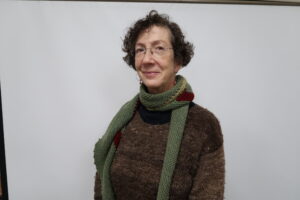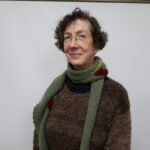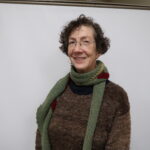Description
One Small Step conversation partners Alivia Moore (36) and Sally Kirkpatrick (63) talk about religion, parenting, sexuality, faith, white supremacy, settler colonialism, indigeneity, food sovereignty, and rematriation.Subject Log / Time Code
Sally Kirkpatrick (SK) and Aliva Moore (AM) introduce themselves.
Participants ask each other why they want to participate in a One Small Step (OSS) conversation. SK talks about how people need to be less siloed and find a way to talk to each other. AM talks about the benefit of coming together intentionally for a conversation across differences, especially as a Penobscot person who is often in conversation with people who think differently.
AM reads SK's bio and asks about what SK means by "supporting activities that promote the care of creation." SK responds with her views on the human body and the natural world.
AM asks SK about being a Christian with two queer kids. SK discusses their coming out, her journey to acceptance through her faith, googling "Christians with gay kids," and her love for her children.
SK reads AM's bio and asks what "Two-Spirit" means. AM acknowledges the limitation of it being an English term and goes on to describe what it means to her/them.
SK asks AM about food sovereignty. AM talks about food sovereignty through a Wabanaki and Penobscot lens.
SK notes they may use different language and labels for it but that they are saying a lot of the same things. She asks AM to talk about how raising kids in a non-Penobscot culture causes her/them anguish.
AM talks about growing up in her/their tribal community, how her/their kids are the first generation in about 13,000 years to be raised outside of Penobscot culture, the difference between being Penobscot vs. being white people with native ancestors, and AM's work creating more places for Wabanaki people to be together, practice culture, raise children, and know their responsibilities to the earth and to one another.
SK asks how being Two-Spirit impacts AM's parenting, AM responds.
SK asks about growing up on the Penobscot reservation. AM talks about a sense of belonging as well as understanding the limitations of the island vs. the expansiveness of Penobscot territory at large and the importance of being in relation with other parts of Penobscot homelands.
AM asks SK about one or two people who have influenced her. SK talks about her mother and father as well as her husband.
AM talks about her/their maternal grandmother.
AM asks SK to describe her personal, political values. SK talks about her belief that every human being is a bearer of the divine image, pacificism, and human life being of inestimable value.
SK asks AM to talk about her/their personal, political values. AM talks about existing outside political terms, a belief in restoring matriarchy, sometimes describing self as being radical and anti-capitalist.
AM asks SK if she ever feels misunderstood by people who think differently than her. SK says yes, especially in regards to her Christianity, how people assume that she must think certain things because she's Christian, a feeling that the word "Christian" has been co-opted by Christian nationalists.
AM asks if SK feels troubled by people who have the same beliefs as her and how they communicate those beliefs to others.
SK talks about describing herself as a "hippie Christian." SK talks about her son coming out, his journey to reconciling his sexuality with his religion/faith, fear of his parents not liking him because of his sexuality not aligning with his perception of their faith. SK mentions her daughter and their faith, difficulty finding a church they feel at home in, and how "Jesus never said a word about gay people."
SK asks if AM ever feels troubled by people who have the same beliefs and they communicate them to others. AM talks about how few people understand both white supremacy and settler colonialism, and how they are so often conflated.
SK asks how, as a white person, she can interact with these issues in a healthy, helpful way.
AM talks about the importance white people working through these issues with other white people. AM talks about how white supremacy and anti-blackness are visual and how settler colonialism can work to render native people invisible, and how it's important to remember that native people, Penobscot and Wabanaki people, are still here through simple concepts such as that some people call the recording site, "Old Town, Maine" but that other people call it alenapayi-menahan.
SK talks about living in Orono for 25 years and only going to Indian Island a few times. AM asks if SK would like to hear AM's thoughts on it.
AM talks about why she/they didn't make an effort to find a spot to record the conversation on Indian Island and reminds SK that she probably interacted with many native people in Orono. AM talks about non-native people asking themselves if they should—or are welcome to—go to Indian Island, how little land the Penobscot Nation has left, and how there isn't even enough room for them on the reservation.
AM asks about SK's hopes for the future. SK talks about a hope for turning down the volume of hatred and anger, and recognizing each other as human beings.
AM talks about climate anxiety and creating a more interconnected reality for kids/people in her/their sphere of impact.
Participants
- Sally Kirkpatrick
- Alivia Moore


